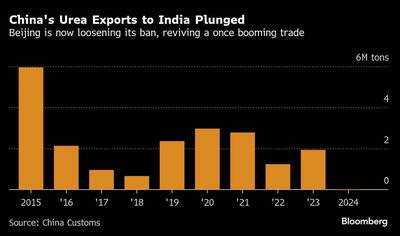China has eased curbs on urea shipments to India, in the latest indication of a thaw in tensions between Beijing and New Delhi as US President Donald Trump’s trade policies target the two Asian nations.
India, the world’s top importer of the crop nutrient, could take as much as 300,000 tons, according to people familiar with the matter. They asked not to be identified as they were not authorized to talk to the media. China is typically a major exporter of the nitrogen-based fertilizer, although it has restricted sales in recent years.
The move from Beijing comes in the wake of Trump’s latest salvo of trade levies — doubling tariffs on Indian goods to 50% as a penalty for its purchases of Russian oil — which has helped warm ties between China and India.
Relations between the two Asian neighbors hit a low point in 2020, when border clashes left 20 Indian fighters and an unknown number of Chinese soldiers dead. India recently allowed tourist visas for Chinese nationals after years of curbs, and Prime Minister Narendra Modi may meet Chinese President Xi Jinping on the sidelines of a summit in Tianjin starting on Aug. 31.
The Ministry of Commerce in Beijing didn’t immediately reply to a fax seeking comment. India’s Ministry of Chemicals and Fertilizers didn’t immediately reply to a request for comment.
In 2023, almost half of China’s exports headed to India. But it halted sales to all destinations last year. Beijing relaxed the ban in June, while keeping its restrictions on India until now.

While the volume is small, it could grow into a significant trade flow, and help ease tight global supplies and cool high prices.
India imported about 5.7 million tons of urea in the fiscal year ended March 31, down almost 20% from a year earlier, according to the Fertiliser Association of India. Purchases from China fell to almost 100,000 tons in 2024-25, compared with 1.87 million tons a year ago, it said.
Given India’s large, farm-dependent economy and the fact that domestic production falls short of demand, the country relies heavily on imports to bridge the gap and make supplies stable for farmers. Urea is heavily subsidized in the country, with the soil nutrient playing a critical role in boosting yields of key crops.
India, the world’s top importer of the crop nutrient, could take as much as 300,000 tons, according to people familiar with the matter. They asked not to be identified as they were not authorized to talk to the media. China is typically a major exporter of the nitrogen-based fertilizer, although it has restricted sales in recent years.
The move from Beijing comes in the wake of Trump’s latest salvo of trade levies — doubling tariffs on Indian goods to 50% as a penalty for its purchases of Russian oil — which has helped warm ties between China and India.
Relations between the two Asian neighbors hit a low point in 2020, when border clashes left 20 Indian fighters and an unknown number of Chinese soldiers dead. India recently allowed tourist visas for Chinese nationals after years of curbs, and Prime Minister Narendra Modi may meet Chinese President Xi Jinping on the sidelines of a summit in Tianjin starting on Aug. 31.
The Ministry of Commerce in Beijing didn’t immediately reply to a fax seeking comment. India’s Ministry of Chemicals and Fertilizers didn’t immediately reply to a request for comment.
In 2023, almost half of China’s exports headed to India. But it halted sales to all destinations last year. Beijing relaxed the ban in June, while keeping its restrictions on India until now.
While the volume is small, it could grow into a significant trade flow, and help ease tight global supplies and cool high prices.
India imported about 5.7 million tons of urea in the fiscal year ended March 31, down almost 20% from a year earlier, according to the Fertiliser Association of India. Purchases from China fell to almost 100,000 tons in 2024-25, compared with 1.87 million tons a year ago, it said.
Given India’s large, farm-dependent economy and the fact that domestic production falls short of demand, the country relies heavily on imports to bridge the gap and make supplies stable for farmers. Urea is heavily subsidized in the country, with the soil nutrient playing a critical role in boosting yields of key crops.
You may also like

'Opportunity to leave': Netanyahu says he 'will allow' Palestinians to exit Gaza during war; says departure will be voluntary

Heavy rains force school closure in 3 J&K districts

DPL 2025: East Delhi Riders Clinch Last-over Win Against Purani Dilli 6

Lok Sabha extends deadline for 'One Nation, One Election' panel report

Luis Enrique makes striking Gianluigi Donnarumma comment as Man Utd and City circle






